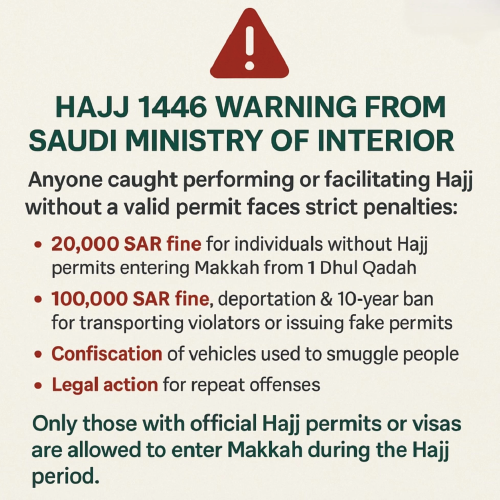
Going for Hajj in 2025? Do These 10 Things Before You Leave
The opportunity to perform Hajj is a divine invitation an experience that transforms the heart, mind, and soul. If you’re

As you prepare for the sacred journey of Hajj or Umrah, one of the most important spiritual steps is entering the state of Ihram with a sincere niyyah, or intention. But for many first-time pilgrims, especially those traveling from countries far from Saudi Arabia like Kenya, the question arises: “Did I make the niyyah correctly?” […]
As you prepare for the sacred journey of Hajj or Umrah, one of the most important spiritual steps is entering the state of Ihram with a sincere niyyah, or intention. But for many first-time pilgrims, especially those traveling from countries far from Saudi Arabia like Kenya, the question arises: “Did I make the niyyah correctly?” This episode aims to address that concern with clarity and reassurance, based on authentic Islamic guidance.
In Islam, niyyah is made with the heart, and the timing and location of that intention matter — especially when it comes to Hajj and Umrah. The common misunderstanding is that you must make your niyyah before boarding the plane or even while still at home. But that’s not correct. You do not make your niyyah while still in Kenya.
Instead, you wait until you are near the Miqat — the geographical boundary set by the Prophet Muhammad ﷺ, where pilgrims officially enter into the state of Ihram. For those flying from Kenya (whether from Nairobi, Mombasa, or another city), the correct place to make your niyyah is in the air, approximately 30 to 40 minutes before your plane lands in either Jeddah or Madinah.
At this point during the flight, you should:
Change into your Ihram garments, either in the plane or before boarding if necessary.
Prepare yourself mentally and spiritually for the pilgrimage.
Form your intention in your heart — that you are now entering Ihram for the sake of Umrah or Hajj.
If you like, you may say the words aloud (e.g., “Labbayk Allahumma Umrah”), but remember — verbal declaration is not required. The niyyah is valid as long as it’s in your heart.
Entering Ihram too early — for example, making your niyyah while still at home in Kenya — means you start observing the restrictions of Ihram before it’s necessary. This includes avoiding perfume, cutting nails or hair, or wearing stitched clothing. While your niyyah may still be valid, it unnecessarily burdens your journey and may make your travel experience more uncomfortable than it needs to be.
That’s why the best practice is to wait until you are near the Miqat. Most airlines announce when you’re approaching this zone, or your group leader will guide you. If you’re traveling independently, set a reminder with your flight time and location. Once you cross the Miqat without Ihram, your Umrah is not valid unless you return and enter Ihram properly — which could be expensive and difficult.
This episode reminds us that the essence of Hajj and Umrah lies not in complicated rituals, but in clear intention and submission to Allah. Whether or not you say the intention aloud, the key is that your heart is committed to the act of worship. It’s not about getting the Arabic perfectly, or repeating someone else’s words — it’s about standing before Allah with a heart full of sincerity and purpose.
To summarize:
Do not make your niyyah in Kenya.
Make your niyyah in the air, just before reaching the Miqat.
Ensure you’re already in Ihram clothes by that point.
The intention is made in the heart, not by tongue alone.
Trust that your simplicity and sincerity is accepted by Allah ﷻ.
By following this guidance, you’ll be starting your pilgrimage on the right footing — focused, well-informed, and spiritually connected.
🎥 Watch the video explanation here
Stay tuned for Episode 3, where we explore the next steps of your Hajj journey. If you’re enjoying this series, don’t forget to share it with fellow travelers.

The opportunity to perform Hajj is a divine invitation an experience that transforms the heart, mind, and soul. If you’re

As the Hajj season approaches, Saudi Arabia’s Ministry of Interior has introduced stringent measures aimed at safeguarding the sanctity and

Powered by haydar.in